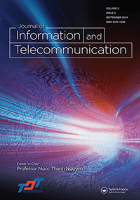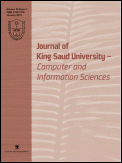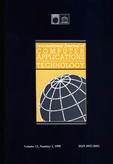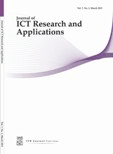
Computers
Scope & Guideline
Pioneering Research in Computing and Communication
Introduction
Aims and Scopes
- Artificial Intelligence and Machine Learning:
This journal frequently publishes research on AI and ML, exploring their applications in various fields such as healthcare, cybersecurity, and education. The methodologies often include deep learning, reinforcement learning, and algorithm optimization. - Cybersecurity and Data Protection:
A significant focus is placed on cybersecurity issues, including intrusion detection, data privacy, and protective measures against cyber threats, reflecting the growing importance of securing digital environments. - Internet of Things (IoT) and Smart Technologies:
Research in this area examines the integration of IoT with various technologies, emphasizing smart city applications, connected devices, and real-time data analytics. - Blockchain Technology and Applications:
The journal highlights advancements in blockchain technology, including its applications in secure transactions, decentralized systems, and data integrity across various sectors. - Educational Technology and Learning Systems:
There is a strong emphasis on educational applications of technology, focusing on enhancing learning experiences through gamification, virtual reality, and adaptive learning systems. - Computational Methods and Algorithm Development:
The journal contributes to the development of new computational techniques and algorithms, addressing challenges in areas such as optimization, data analysis, and simulation. - Human-Computer Interaction and User Experience:
Research exploring user interaction with digital systems, including usability studies and user-centered design methodologies, is regularly featured.
Trending and Emerging
- Deep Learning and Neural Networks:
There is a growing trend towards research involving advanced neural network architectures and deep learning techniques, particularly in applications related to image processing and natural language processing. - Health Informatics and Digital Health Solutions:
The integration of computing technologies in healthcare, including telemedicine, health data analytics, and AI applications for disease diagnosis, has gained significant traction. - Sustainability and Green Computing:
Research that emphasizes sustainable computing practices, energy-efficient systems, and the environmental impact of technology is on the rise, reflecting global sustainability goals. - Augmented and Virtual Reality Applications:
Emerging interest in AR and VR technologies is evident, particularly in educational contexts and training simulations, indicating their potential for enhancing learning experiences. - Quantum Computing and Quantum Information:
Research exploring the principles and applications of quantum computing is starting to emerge, indicating a forward-looking approach to next-generation computing technologies. - Ethics in Computing and AI:
As AI technologies proliferate, there is a growing emphasis on ethical considerations, including fairness, accountability, and transparency in AI systems, which is becoming a critical area of inquiry.
Declining or Waning
- Traditional Software Development Practices:
There has been a noticeable decrease in research focusing on conventional software engineering methodologies, as the field shifts towards more agile and adaptable development practices. - Basic Computer Science Education:
Topics centered around introductory computer science education seem to be less prevalent, potentially overshadowed by the demand for advanced applications and technologies in teaching. - Legacy Systems and Technologies:
Research on outdated or legacy technologies has become less common, as the emphasis moves towards modern, scalable, and efficient systems and architectures. - General Networking Protocols:
There appears to be a decline in studies specifically targeting traditional networking protocols, as newer technologies and frameworks are increasingly prioritized.
Similar Journals

Human-centric Computing and Information Sciences
Championing Open Access for Global Knowledge ExchangeHuman-centric Computing and Information Sciences, published by the Korea Information Processing Society, represents a leading platform in the field of computer science, particularly focusing on the interaction between humans and computational systems. With an impressive Q1 ranking in the 2023 category of Computer Science (miscellaneous) and a commendable Scopus rank of #14/232 (94th percentile), this journal has established itself as a cornerstone for researchers and practitioners dedicated to advancing understanding in this vital area. Understanding the significance of making technology more accessible and effective for users, the journal has been an Open Access publication since 2011, promoting wide dissemination of knowledge without barriers. The journal's scope encompasses innovative methodologies, user experience design, and the integration of human factors into computing environments, making it essential reading for anyone interested in the intersection of technology and society. With all articles freely accessible, the journal not only contributes to scholarly discourse but also encourages collaboration among researchers worldwide, fostering further advancements in human-centric computing.

Applied Computing and Informatics
Elevating Standards in Applied Computing and InformaticsApplied Computing and Informatics, published by Emerald Group Publishing Ltd, is a prominent open-access journal that has been serving the academic community since 2011. With a focus on advancing the fields of Computer Science Applications, Information Systems, and Software, this journal has established itself as a noteworthy publication, currently ranking in the Q3 quartile for each of its categories in 2023. The journal is particularly recognized for its commitment to disseminating high-quality research, as evidenced by its impressive Scopus rankings—placing it in the 92nd percentile for Computer Science Applications and the 91st percentile for both Information Systems and Software. Based in Saudi Arabia, it adopts a global perspective, inviting contributions from researchers worldwide. With its open-access policy, Applied Computing and Informatics ensures that cutting-edge research is accessible to a broad audience, fostering collaboration and innovation within the computing and informatics disciplines. This journal is an essential resource for academics, professionals, and students seeking to keep abreast of the latest trends and developments in their field.

Frontiers in Computer Science
Exploring innovative horizons in computer science research.Frontiers in Computer Science is a premier open-access journal published by Frontiers Media SA that has rapidly established itself as a prominent platform for scholarly research in the diverse and evolving field of computer science. With a notable impact factor reflecting its high citation rates, this journal aims to disseminate innovative findings and groundbreaking studies across multiple subdisciplines, including Computer Science Applications, Computer Vision and Pattern Recognition, and Human-Computer Interaction. Since its inception in 2019, and with a consistent trajectory from 2019 to 2024, it has garnered accolades, achieving Q2 ranking in several categories and an impressive Q1 in miscellaneous areas of computer science. Researchers, professionals, and students alike are encouraged to contribute to this dynamic journal that serves as a vital resource for advancing knowledge and fostering collaborative dialogue in the global computer science community. Frontiers in Computer Science is committed to providing open access to research, promoting unrestricted sharing of ideas and fostering innovation at the intersection of technology and society.

Journal of Information and Telecommunication
Empowering Research, Transforming the Digital Landscape.Journal of Information and Telecommunication, published by TAYLOR & FRANCIS LTD, is a distinguished open access journal that has been enhancing the global discourse since its establishment in 2017. With an ISSN of 2475-1839 and an E-ISSN of 2475-1847, this journal is located in the United Kingdom and dedicates its focus to the fields of information technology, telecommunications, and related disciplines. Boasting a respectable Q2 quartile ranking across various categories including Computer Networks and Communications, Electrical and Electronic Engineering, and Computer Science Applications in 2023, it ranks notably in the top percentiles of scopus rankings, asserting its significance in the academic community. The journal's commitment to open access since its inception has fostered widespread accessibility, encouraging research dissemination and collaboration on a global scale. By providing a platform for high-quality research, it aims to unite researchers, professionals, and students in their pursuit of innovation and excellence in the ever-evolving digital landscape.

Journal of King Saud University-Computer and Information Sciences
Leading the Charge in Cutting-edge ResearchJournal of King Saud University-Computer and Information Sciences, published by ELSEVIER, is a prestigious open-access journal focusing on the rapidly evolving fields of computer science and information technology. Since its inception in 1996, this journal has provided a platform for high-quality research and innovative ideas, promoting the dissemination of knowledge to a global audience. With a remarkable impact factor and ranked Q1 in the Computer Science (miscellaneous) category as of 2023, it stands among the top 11% of journals in its field, reflecting its commitment to excellence and relevance. The journal proudly carries the ISSN 1319-1578 and E-ISSN 2213-1248, and it is based in Saudi Arabia while being part of a global academic network. With a Scopus rank of #26 out of 232 in general computer science, the Journal of King Saud University-Computer and Information Sciences is an essential resource for researchers, professionals, and students seeking to stay at the forefront of technological advancement. As it continues to thrive through 2024, it invites contributions that will shape the future of computing and information sciences.

Journal of Information Processing Systems
Elevating Standards in Software and Information StudiesJournal of Information Processing Systems, published by the Korea Information Processing Society, serves as a pivotal platform in the fields of Information Systems and Software, catering to an audience of researchers, professionals, and students. With an ISSN of 1976-913X and an E-ISSN of 2092-805X, this journal has established its presence since its inception in 2012, continually contributing valuable insights and advancements through 2024. Notably, it has achieved a Q3 ranking within its respective categories, reflecting its ongoing commitment to quality research, evidenced by its Scopus rankings—#221 out of 394 in Information Systems and #263 out of 407 in Software. Although it currently does not offer Open Access, the journal emphasizes robust research methodologies and innovative solutions, making it an essential resource for those engaged in the rapidly evolving domain of information processing. With its base located in Seoul, South Korea, the journal remains dedicated to fostering collaboration and knowledge exchange in the global community.

INTERNATIONAL JOURNAL OF COMPUTER APPLICATIONS IN TECHNOLOGY
Fostering knowledge and innovation in computer networks and communications.International Journal of Computer Applications in Technology is a reputable academic journal published by InderScience Enterprises Ltd, dedicated to advancing the field of computer applications across various domains including Computer Networks and Communications, Computer Science Applications, and more. With an ISSN of 0952-8091 and an E-ISSN of 1741-5047, this journal has been a credible source of research since its inception in 1976, transitioning into its current form in 1988. With its consistent rank in the Q3 quartile for several key engineering and computer science categories in 2023, it highlights the significance of the journal and its contributions to ongoing discourse in these fields. Researchers benefit from its wide-ranging scope, which encompasses both theoretical and practical applications of technology, making it an invaluable resource for both industry professionals and academic scholars. Although it currently does not provide open access, the journal remains committed to disseminating high-quality research that is essential for technological advancement and innovation.

JOURNAL OF COMPUTER SCIENCE AND TECHNOLOGY
Fostering Breakthroughs in Technology and ApplicationJOURNAL OF COMPUTER SCIENCE AND TECHNOLOGY, published by Springer Singapore Pte Ltd, is a pivotal platform in the rapidly evolving realms of computer science and technology. With an ISSN of 1000-9000 and an E-ISSN of 1860-4749, this journal encompasses a diverse array of topics including computational theory, hardware and architecture, software engineering, and applications of computer science. Spanning over three decades from 1986 to 2024, it boasts an impressive standing within academic circles, ranking in the Q2 quartile across several key categories and achieving notable placement in Scopus metrics. Although this journal operates under a subscription-based model, it remains a crucial resource for researchers, professionals, and students seeking to advance their knowledge and contribute to discussions in computer science. The JOURNAL OF COMPUTER SCIENCE AND TECHNOLOGY is committed to fostering innovation and scholarly communication in the field, encouraging submissions that contribute substantive advancements in theory and application.

Journal of Advances in Information Technology
Empowering Innovation in Information TechnologyJournal of Advances in Information Technology, published by ENGINEERING & TECHNOLOGY PUBLISHING, is an essential platform for researchers, professionals, and students invested in the dynamic fields of information technology, artificial intelligence, and computer science. With its ISNN of 1798-2340, this journal provides a rigorous peer-reviewed environment that supports the dissemination of innovative research findings, methodologies, and case studies. Since its inception in 2019, it has made notable strides, as reflected in its Q3 quartile rankings across various categories, including Artificial Intelligence and Software, and maintains respectable Scopus rankings, further solidifying its position as a key player in the academic community. Featuring a diverse range of topics within its scope, the journal encourages open access to knowledge while serving as a beacon for those seeking to expand their understanding of current trends and technologies shaping the future. Join us in advancing the field with impactful research that is both relevant and cutting-edge.

Journal of ICT Research and Applications
Exploring New Horizons in ICT ApplicationsJournal of ICT Research and Applications, published by ITB JOURNAL PUBL, is a prominent open-access journal since 2013 that serves as a vital platform for disseminating innovative research in the fields of Information and Communication Technology. Based in Indonesia, this journal provides a valuable resource for researchers, professionals, and students interested in the evolving landscape of computer science, electrical engineering, and information systems. Though currently placed in Q4 across its relevant categories for the year 2023, the journal aims to enhance its visibility and impact within the academic community by inviting high-quality submissions that explore interdisciplinary approaches and novel applications of ICT. With its transparent open-access model, the Journal of ICT Research and Applications ensures that research findings are readily accessible, fostering collaboration and knowledge sharing among scholars worldwide. Its commitment to advancing ICT research and practices solidifies its role as a meaningful contributor to these dynamic fields.